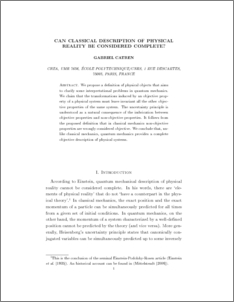Catren, Gabriel
(2008)
Can Classical Description of Physical Reality Be Considered Complete?
[Preprint]
This is the latest version of this item.
![[img]](https://philsci-archive.pitt.edu/style/images/fileicons/application_pdf.png)  Preview |
|
PDF
Can_Classical_Description_of_Physical_Reality_Be_Considered_Complete_-_Catren.pdf
Download (169kB)
|
Abstract
We propose a definition of physical objects that aims to clarify some interpretational problems in quantum mechanics. We claim that the transformations induced by an objective property of a physical system must leave invariant all the other objective properties of the same system. The uncertainty principle is understood as a natural consequence of the imbrication between objective properties and non-objective properties. It follows from the proposed definition that in classical mechanics non-objective properties are wrongly considered objective. We conclude that, unlike classical mechanics, quantum mechanics provides a complete objective description of physical systems.
Available Versions of this Item
Monthly Views for the past 3 years
Monthly Downloads for the past 3 years
Plum Analytics
Actions (login required)
 |
View Item |



